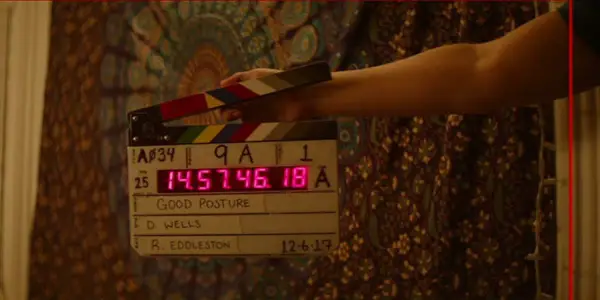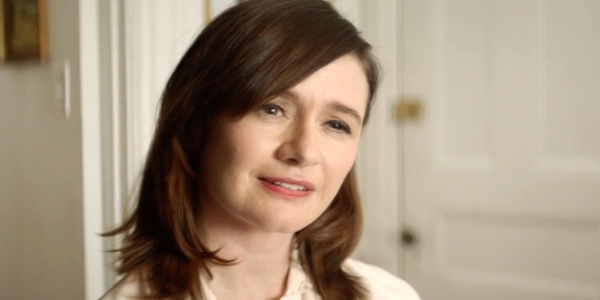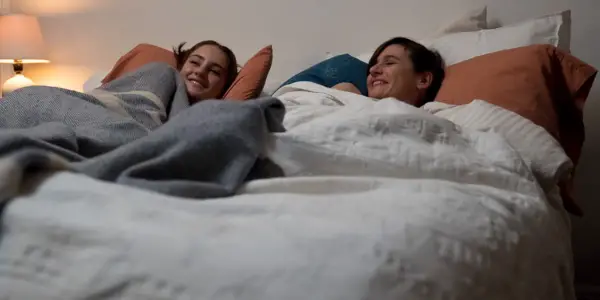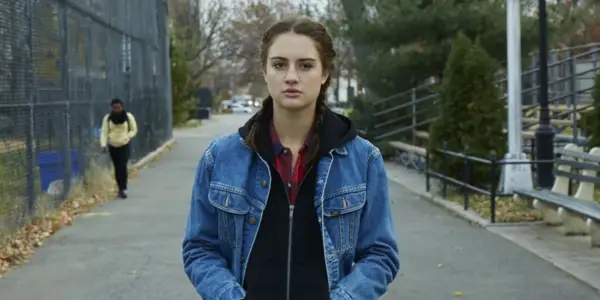Tribeca 2019: Interview With GOOD POSTURE Director Dolly Wells & Stars Emily Mortimer And Grace Van Patten

Stephanie Archer is 39 year old film fanatic living in…
During my time at the 2019 Tribeca Film Festival, I had to opportunity to sit down with the director of Good Posture, Dolly Wells, as well as the film’s leading ladies, Emily Mortimer and Grace Van Patten. What unfolded was a lovely conversation full of laughs, intel and a shared love for film.
Stephanie Archer for Film Inquiry: I just saw Good Posture yesterday. That was awesome and so funny. And it was a really great coming-of-age story. Dolly, where did you get the idea for the film?
Dolly Wells: I think it was a combination of things. One was, it was interesting to me, a cousin of mine lived with a writer and I just thought there was something interesting about that, about the public persona of a writer that’s held in very high regard, but is quite private and sort of has this life that you’re seeing. Lillian, who’s not really interested in reading, is not at all in awe of this woman who has got this sort of public persona.
It’s awful that I can’t quite remember where it came from. But once I started thinking about that, these two women, that was about it really. And then I read a book about Doris Lessing, who was a writer who took in this writer called Jenny Diski, and it was a book called In Gratitude. And I read that, there was something, I just thought, there was an interesting idea, this sort of public persona of the people inside of this slight prisoniness of great expectation, but it’s this woman that isn’t leaving the house and sort of stuck in this thing at the same time as this young woman who’s coming back to sort of find herself.
This is your directorial debut. How was it transitioning from in front of the camera to behind the camera?
Dolly Wells: It was really fun. It was really funny. Well, the main thing that I got from it actually, which is silly not to have gotten after 23 years of the acting, is such a respect for actors because you suddenly sort of think, God, you’re telling people this idea that you’ve sort of gotten together, that you’ve written, and you don’t want, well I haven’t realized that so much when I was just acting with other people because you’re just worried about your own performance and what you’re doing, but there’s something I felt like, wow, this is such an amazing thing that these people are, there’s the trust that actors puts it into the director and the story that they’re telling I thought was really, it was amazing. So I love that. I find it really fun working with actors. I also think it’s really exciting when you’re a little bit older to be suddenly starting something brand new that you’ve never tried before.
It felt so fun to be like, I have no idea, you know? They’d be like, okay, what do you want to happen with this scene? Well, I know what I want to happen emotionally, but I don’t know where I want the camera to be or you know. Learning something brand new. I think that keeps you young.

How long have you wanted to direct?
Dolly Wells: I don’t know if I even knew that I did want to direct. I think I felt too scared. I felt a bit shy about it. Jamie Adams, who makes improvise films in England, had put me in some of his films, and he said, I really think you should. He came to me and two other actors and said I bet you’ve got stories to tell, I bet you have. I said no the first time. And instead, I did a play with Grace off Broadway and then I just couldn’t do it. And then he came to me again and said, I think that Maggie wants you, the producer probably won’t ask you again, like if you say no twice. So then I was like okay, okay. I think if I’d been talking very quietly to somebody thinking nobody else was listening, I would say I would love to direct, but I didn’t have the confidence to.
He was kind of your Julia.
Grace Van Patten and Dolly Wells: Yeah.
And where did the idea for communicating with the journal come from? Like specifically in general?
That was, [to Emily and Grace] do you remember we had some conversation in my room about whether it would be in a book
Grace Van Patten: Or on the wall…
Dolly Wells: yeah, there was something. I just knew I didn’t want them to, well, there were lots of things, I don’t want to burst the bubble, but there were time constraints because Emily had a lot on. So I knew that you wouldn’t, and I liked the idea of the mystery. I wanted Grace to be sort of knocking around on her own in this house. I didn’t want them to be meeting and chatting all the time. I wanted there to be a communication that was happening between them, but it’s been distant. Also, she’s a writer, so the idea of that being a way to communicate just seemed right
Because there’s such an age difference between the two ladies it was just interesting that you choose a journal to handwrite rather than Snapchat or email.
Grace Van Patten: I think it’s cool too because just like any conversation, you have on text or letters, not that I write letters, but in journals, it allows you to almost be more vulnerable than you can in person because there’s this barrier and you’re not looking somebody in the eyes, which people have a hard time doing these days. I think it allowed both of our characters to develop a relationship that we wouldn’t necessarily develop speaking one on one.
Emily Mortimer: Yeah. Yeah. Or texting or anything…
Grace Van Patten: …because there’s something genuine about writing, especially if I’m silent.
Emily Mortimer: Also we are trying to set up, it’s such an invasion..
Grace Van Patten: first it’s really off putting..
Emily Mortimer: Also, there’s something about the way that Dol wrote those entries that’s very cool because it is literally in a way that you wouldn’t if you were writing an email or a text. I felt like they were showing off to each other, they are kind of flirting with each other, with writing, which is really cool.
Dolly Wells: And also Grace’s character Lillian, her boyfriend in the beginning was like, do you have any goals? You don’t even write in your journal. So it’s the fact that in a way Julia starts her off writing in a journal and I feel like in a way, it’s a silly thing to say, but that actually ended that with me. Like when we were in our twenties, I would write little tiny things and put them in a drawer and then she was like, why don’t we try writing something together? And that is what Julia does, Julia is encouraging Lillian by writing to her. It makes it more permanent, you are writing this thing, writing something down.

There are a lot of examples of confinement in the film. You have the shed in the back, you have Julie’s room or the house and the neighborhood that Lillian doesn’t leave. You had your own confinement having filmed this in 12 days. I was just wondering what kind of challenges that might have presented to you guys with that being such a short amount of time.
Dolly Wells: Well, there was something humbling in that you couldn’t really hold on to anything too much. I can remember being told we have to get rid of eight pages and you’re like, that’s not going to make sense. You just have to sort of work on the fly. And then luckily it felt like, Grace and I talked quite a lot before we shot, so I felt very quickly that she understood the character right from the beginning.
I think we just knew that while we were in it, we will typically submerged in it. So there was no time, there was something that was really lovely about that for me, there wasn’t time to be really challenged and she was like, that works, that works. She totally knows. She’s totally Lillian. So we didn’t have to be going off none of these talks to squeeze something else and focus. So there were constraints, but they were basically, we knew them from the start. We didn’t have very many locations. There weren’t that many actors in it. It wasn’t going to take half a day to move location or anything like that.
I like the use of the documentary testimonials throughout the film. So it’s kinda like we’re watching Lillian’s movie unfold in front of us while we’re watching the movie. What inspired this idea to mix those genres?
Dolly Wells: Yeah, I think that actually, its a different version that we did on that the play, in this case it was a way of showing she wanted be in a film school and she was suddenly, you know, that she’s all talk really in the beginning. So when she sees her ex-boyfriend with this woman who makes improbable things, she is just like, well, I’m making a film. And I felt like it was a good way of, an economic way of revealing Lillian’s character. The fact that she couldn’t really commit to things, or it wasn’t very serious about it. And the fact that you discovered Julia because you didn’t see her very much, that you would about her through these descriptions.
The soundtrack choices were incredible, hoping when you get distribution there is a soundtrack to go with it. But especially the first song, it had a really intense pulsating heartbeat. What went into selecting those songs?
Dolly Wells: That was really, really fun. It’s funny because I didn’t always feel that confidence about music. But in this situation, I love The Breeders and I felt like I wanted this sense of urgency, I wanted a woman to be singing, and there was just something about the beat of that, it felt claustrophobic of her in her room. Then the two beautiful songs when she’s walking to see her father with the flowers and when she’s listening at the door to see, you know, while she’s brushing her teeth and everything, that is a musician called Tom John who we know from Cape Cod who is a brilliant singer, and that’s not even his full job, and he just gave us those songs. I can’t wait for him to see it tomorrow. It really moves me because he hasn’t seen the film. He’s a very sort of ethereal person that can be a professional singer, but it just doesn’t really interest him.
So he’s responsible for that. And then a woman called Heather Christian is the musical composer and she just did such a brilliant job. I thought just the way when Grace is at the door and it’s is saying [sings] come, come, come. I felt really excited. I do feel really proud of that.

Even that first song says “no one loves me, no one”. It just fit with the music and lyrics, everything just went together really well. Having collaborated on Doll and Em, what was it like working together again [Dolly and Emily]?
Dolly Wells: It was really fun it was great. I felt so touched that she wanted to be in it and then it was really fun. I mean there was moments of being frightened the first day she arrived. But it was wonderful because it was also exciting, but that’s part of what’s so fun, it was really fun watching her acting with Grace. It was all working. So that scene at the dinner table, which I think was the first day you came, I felt so excited about that scene, because it so mattered to me. I felt really excited because I could step back and watch and I was like, this is perfect – Em is Julia. I felt just really touched, I’m really lucky that she wanted to do it. And I felt really thrilled that we were trying a new thing, me being her director and it was really easy to direct her and then she was just taking it seriously. And I just keep saying it was just so amazing and wonderful.
Emily Mortimer: I just keep saying it was just so amazing seeing her do it. I mean she is just really good at it. I remember her sitting on the bed in my house telling me the story before she had written it and I cried. There was just something touching, there was something about the emotional center of this film I just thought was really interesting and cool, I just have had so much faith in her forever, so I knew she was bright and brilliant enough to do it, but I didn’t know just how confident and serene she would be as a director and I was just bowled over.
I’ve really hardly ever had that feeling, it is a big deal directing a movie especially one that you’ve written, and people are generally anxious and there’s a a feeling of like, Oh God, this better be right, this kind of performance anxiety the director has, especially a first time director, that you kind of are doing your best to separate yourself from as the actor, not get infected by and try to help them through and she just had none of it. It suits her so well. She’s brilliant. It’s like suddenly all the noise in her head goes. It’s amazing just seeing this kind of calm descend and she was just so in her element and so generous and kind and made you feel like you could be your best self and gave you space and time to do that and she believed in you and it was really extraordinary.
Dolly Wells: Also it was like, very very lucky, you couldn’t take your eyes of Grace and I was very aware about that. There are pictures taken of me or like video of me watching her, you just start saying, if she wasn’t like this, this would be a terrible film. What I mean, but if you didn’t have the feeling of being behind, you know, because it’s a very complicated part that she was playing, she knows she’s entitled, she’s spoiled. She’s sort of numb to things and yet you see this vulnerability that was really what took my fear away. I was like, wow, this is actually fine. I don’t really have to do very much. I just have to really watch every body and enjoy it.
Emily Mortimer: But that’s a skill in itself, just having faith in what’s happening and not getting in the way of what’s happening, but managing it sometimes. That’s where there’s the confidence.

Grace Van Patten: But also the way you wrote it too, she was obviously entitled and had a lot to learn, but you still felt for her. You really sympathized and wanted her to do well. Get it together.
Grace, what drew you to this script?
Grace Van Patten: Dolly. Dolly. I didn’t read the script yet and Dolly called me and said she’s making a movie and that was all I need to hear.
Dolly Wells: Awe. It was like a date because she was there with it…
Grace Van Patten: But she called me, just told me about it and it sounded amazing and I had the best time working with her, acting together and I knew she would kill it and I was so excited, I didn’t have to hear much to be convinced.
Where Julia keeps to herself, so too does Lillian. I was wondering, what was it like filming all these scenes by herself?
Grace Van Patten: It was interesting. I hadn’t done that before. It helped a lot because it was a small movie, I think because it was a small crew and because I knew Dolly really well and she trusted me and I felt that I trusted her completely and I felt super comfortable and free to kind of just be there and zone and just fell in it.
Dolly Wells: Which she really did because also so you can’t have, like its in a small room with lenses that stretch the whole room. It needed a real specific level. Like if she’d been, someone told me smackting, like is she had been overacting, it could have quickly been – You could feel everything going on with her doing very little. You feel the pain. It kind of felt like you did think you were on your own.
Film Inquiry would like to thank Dolly Well, Emily Mortimer and Grace Van Patton for taking the time to speak with us.
Does content like this matter to you?
Become a Member and support film journalism. Unlock access to all of Film Inquiry`s great articles. Join a community of like-minded readers who are passionate about cinema - get access to our private members Network, give back to independent filmmakers, and more.













